The trades that a lot of us were anticipating have been slow to materialize, though we did get a couple important moves on the weekend. Ryan Johansen is now in Colorado, and that was covered by Ian, while Sean Durzi is now in Arizona, a trade that Ian also wrote about.
Picking up Johansen at half price is a nice bit of business for the Avalanche. It gives them a 2C that they were lacking, and one with playmaking skills that can help their scoring wingers. It also gives them a guy they can use in that role for a couple years until they figure out a longer-term solution. It is a nice boost fantasy-wise for himself and the wingers.
As for Durzi, there are holes to his game. He is fine in transition with good puck skills but he has a lot of work to do in his own end. Tracking data shows Durzi allowing nearly 32% more scoring chances per zone entry than the next-worst Kings defenceman in 2022-23:
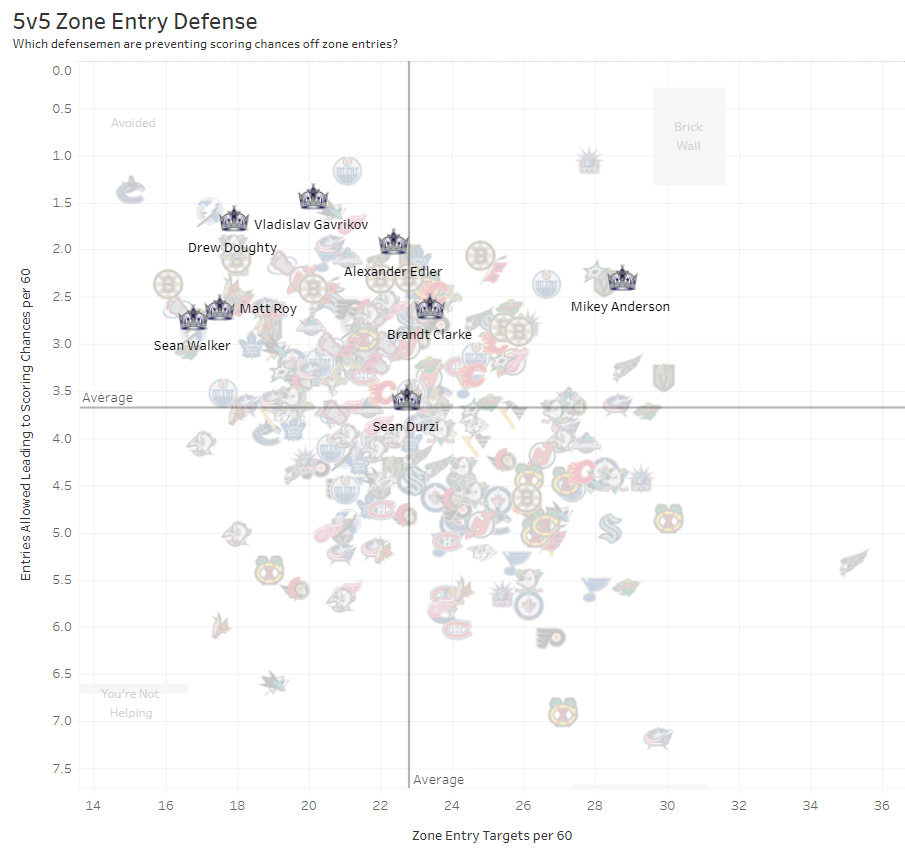
The two worst blue liners for Los Angeles were Durzi and Sean Walker, and both are gone from the franchise.
It seems a good move for Durzi. The Coyotes are on the rise and should be better while the new Arizona rearguard has a legit shot at PP1 ice time. If he can get that and even 19-20 minutes overall, he is very much a 40-point threat with well over 200 hits+blocks. That will play well in multi-cat formats so let's see how the rest of their summer goes.
*
Taylor Hall is now a Chicago Blackhawks in what amounted to a cap-dump trade. Dobber has his thoughts on it here. Nothing much to add on my part; I’m going to wait to see what Chicago does to the roster over the next week. Hall will be a good, quick playmaker for Bedard and that’s something important for the rookie to have early in his career.
*
The 2023 NHL Awards were on Monday night and some of the major awards went the direction a lot of fans expected. Connor McDavid swept the MVP awards by taking home both the Hart and Ted Lindsay trophies, while Boston teammates Patrice Bergeron and Linus Ullmark earned the Selke and Vezina Trophies, respectively. Their coach Jim Montgomery was the Coach of the Year in a deserved honour. There was maybe some trepidation as to the Calder Trophy and how much weight voters may give Stuart Skinner's performance after he became the starter in Edmonton, but that went to Matty Beniers, who was the only rookie to crack the 50-point mark (he had 57 in 80 games).
It was the Norris Trophy that seemed to have some debate around it. The balance was between Erik Karlsson's superlative offensive season on a basement team, or Adam Fox's elite all-around play in all situations, or Cale Makar's typical dominance from the blue line in a campaign that saw him miss 22 games. The votes ended decidedly in Karlsson's favour for his third Norris Trophy win, but Fox did garner over 40 first-place votes while Makar finished third.
Regardless of anyone's feelings on the Trophy's voting, I just want to point out what a great time it is to watch defencemen in the NHL. I grew up following the puck-movers like Scott Niedermayer and Nicklas Lidstrom, but to have so many high-end guys playing in the league at the same time feels special. There are the three that were Norris finalists this year, plus Roman Josi, Quinn Hughes, Miro Heiskanen, Victor Hedman, Dougie Hamilton, Charlie McAvoy, and so many more. They are helping make the game more exciting and the fact that there are so many that are improving in their early 20s portends great things for the league. With guys like Olen Zellweger, Brandt Clarke, and Luke Hughes all knocking on the door of a roster spot, there may be a few more like them coming, too.
*
It is a big week in the NHL with the Awards taking place Monday night, the Draft starting Wednesday night and Free Agency on the weekend.
One refrain often heard about the 2023 free agency class – the unrestricted players, not the restricted ones – is that it's a shallow class. This is true; a cursory look at CapFriendly shows names like Ryan O'Reilly, Vladimir Tarasenko, John Klingberg, Tyler Bertuzzi, Dmitry Orlov, and James van Riemsdyk heading the class (among others). We could include names like Patrick Kane, Jonathan Toews, Oliver Ekman-Larsson, and Max Pacioretty, but they all have serious health concerns. When factoring age and health, Bertuzzi may be the most viable name here. No knock to Bertuzzi, but he's a second liner on a Cup contender and if that's the headlining name, well, it's hard to argue it's a shallow class.
A lack of high-end names doesn't mean a lack of impact. There are often cheap free-agent signings that end up having fantasy importance: Andrei Kuzmenko, Dylan Strome, Max Domi, and Frank Vatrano all signed with new teams in the summer of 2022, all had cap hits under $3.7M, and all were top-200 Yahoo! fantasy players by the end of the season. There are some unique cases (overseas signing, unqualified RFA), but they were all available and were fantasy-relevant in most formats.
Let's take a spin through the pending 2023 UFA class to see if we can find some options that could be fantasy-viable in most formats like some of the guys from 2022. The cap information will be from CapFriendly, of course, with our primary sources being Frozen Tools, Natural Stat Trick, Corey Sznajder's tracking data, and Evolving Hockey's contract projections. I will also be cross-referencing some of those contract projections with those of our own Alex MacLean, and his can be viewed here.
Let's get to it. For today, it'll just be a handful of forwards.
Pierre Engvall (Alex's projection of $2.09M AAV)
There are always players who do a lot of good things on the ice but have a skills cap that limits their raw upside. The guy that usually comes to mind for me is Michael Grabner, though there are current NHLers further down this list that qualify. Pierre Engvall also fits that bill has he's in the 80th percentile over the last three seasons by expected goals-for (xGF) impacts – tied with Nazem Kadri – but around the 26th percentile in actual goals-for impacts, worse than names like Jake Evans and Pius Suter. His defence gives him positive goal differentials and is thus what makes him valuable in the real world, but if his actual impacts were ever commensurate to his expected impacts, the team goals produced would mirror names like Kyle Connor and Martin Necas.
I get that's a thin argument to make – "if things were different, they wouldn't be the same" – but it's to highlight that there are good things this player does offensively: he carries the puck a lot as the only Leafs forwards with more zone entries per minute were Mitch Marner, Alex Kerfoot, and William Nylander; he was the only regular bottom-6 Leafs forward to rate above average in both controlled zone entries and entries leading to scoring chances; he can create both off the rush and off the forecheck.
He does have his negatives and turnovers in his zone are chief among them. There are reasons for that, though. First off, Engvall led all Toronto players – forward and defence – in zone exits with possession on a per-minute basis. To compare that to other forwards in the league to lead their teams in controlled zone exits per minute, outside of Connor McDavid, we’re talking about Artemi Panarin, Troy Terry, Oliver Bjorkstrand, Aleksander Barkov, Travis Konecny, Trevor Moore, Mathew Barzal, Mark Scheifele, and Tim Stützle, In other words, Engvall had to do a lot of the heavy lifting in his own zone, and to a level normally reserved for superstar forwards, with an exception or two (and even the exceptions are very good players). In addition, over Engvall's last three years in Toronto, he had a little over 2024 minutes at 5-on-5. In those 2000-plus minutes, he had exactly one (1) forward he spent at least 25% of his ice time with, and it was David Kampf at nearly 48%. Engvall carried Kampf the entire time they were together, and when they were apart, Engvall rarely played with Toronto's stars. He was relied upon to carry the bottom-6 almost single-handedly and would help partially explain all the turnovers. It is also why he led the team’s regulars in both zone exits with possession on a per-minute basis, and failed exits on a per-minute basis; he had to do it all for his line when he was on the ice and that led to a lot of good and some bad.
Engvall's brief time with the New York Islanders went extremely well, too. His 5-on-5 line with Brock Nelson and Kyle Palmieri carried over 58% of the expected goal share and 79% of the goal share. Before Engvall got there, that line's numbers in those two measures were 49% and 59%, respectively, so it's safe to say he had a very positive impact on that second line. In the playoffs, the line carried 52% of the expected goal share and outscored Carolina 5-2 when they were on the ice at 5-on-5. When they were off the ice, the Islanders were outscored 8-4 and carried a 47% expected goal share.
This ran long but it's just to show that, yes, Engvall had his problems turning pucks over in Toronto. I would also say he was given a lot of responsibility to carry below-average-to-bad players on a Cup contender and that matters. He also performed and produced well in New York once he got some ice time with non-borderline NHLers. I don't think this is a Nichushkin-like breakout waiting to happen, but it would not be surprising to see Engvall turn into a 20-goal, 40-point, 80-hit player, and that can play fine in deeper banger leagues.
Daniel Sprong (Alex's Projection of $1.93M AAV)
I know he's an RFA and not a UFA, but I really wanted to include him because of the potential upside.
A quick note on Sprong:
The market share was written about earlier this month, but Sprong took one-third (!) of Seattle's shot attempts when he was on the ice in 2022-23. It isn't as if he's an empty shooter, either, as Sprong's expected goals-for impacts over the last three seasons are in the top-third of NHLers, and a shade behind names like Drake Batherson and Jamie Benn. Unlike Engvall, expected goals turned into a lot of actual goals for Sprong and his teammates as his actual-goals impact in that span was tied with Patrick Kane, and slightly ahead of Brady Tkachuk and Filip Forsberg. As a result, Sprong's 5-on-5 points/60 was 2.3, tied with Kadri, just behind Nico Hischier and Jack Hughes, and just ahead of Sidney Crosby and Clayton Keller.
None of what was just said was a lie, but the difference between the other players and Sprong is the role. Despite an 85th percentile points rate, and 70th percentile expected goals impact, Sprong's 5-on-5 ice time since 2020 is… *squints*… the 3rd percentile? Quite literally only a handful of NHLers have played less per game at 5-on-5 over the last three years than Sprong has. And, on top of all that, the 2022-23 season was a career-low for him outside of his 18-game stint as an 18-year-old.
Whether Sprong can maintain those points and impact rates while playing 16-17 minutes a game is a fair question. With how Seattle runs their team, it's doubtful it happens there, and maybe there's a team out there that sees more in him.
Evan Rodrigues (Alex's projection of $2.66M AAV)
Another player in the same kind of mould as Engvall, though not the same style, is Evan Rodrigues. Over the last two seasons, Rodrigues has had a similar scoring chance contribution measure (9.82/60 minutes) as Sebastian Aho (9.92) and Filip Forbserg (9.73), is among the league leaders in expected goals impacts, and is 91st percentile in 5-on-5 shot rate, just behind Jordan Kyrou and Jonathan Marchessault. His entire problem is his shooting talent as he ranked 306th out of 310 forwards by shooting percentage in those two years. It's not a sample problem, either, as he's finished any season with a 5-on-5 shooting percentage exceeding 7% just once and it was his 35 games during the Bubble campaign. Since Rodrigues entered the league in 2016, there have been 265 forwards to play at least 4000 minutes at 5-on-5. Of those 265 forwards, Rodrigues is 263rd in shooting percentage. So, yeah, there's a pattern here.
The shooting is just one of many reasons why Rodrigues is a fascinating player. If he can ever figure out how to convert at even a league-average rate, there is 30-goal, 60-point, 250-shot upside here. Of course, "figure out how to double your 5-on-5 shooting percentage" is considerably easier said than done and with E-Rod turning 30 in July, time is really running short. He is still a good NHLer and can be useful in fantasy in stretches when those shots are going in with any sort of regularity, but that lack of shooting skill is what will continue to cap his upside regardless of where he lands as a free agent. WHAT IF, though…
Tomas Tatar (Alex's projection of $3.03M AAV)
Tatar had a weird arc post-Detroit. Once he got to Montreal, he maintained excellent expected goals impacts that he mostly had with the Red Wings; he was, quite literally, second among all forwards in xG impacts from 2018-2021, trailing only Mark Stone. While the goals didn't follow to that level, his goals impact differential ended up being in the 92nd percentile of the league. Hyper-elite play-driving led to excellent goal-driving and that's what made him a valuable winger.
That fell apart, both offensively and defensively, in 2021-22, putting his future effectiveness in doubt. He rebounded in a massive way in 2022-23 ranking fourth among all regular forwards in xG impact and sixth by actual-goals impacts. If went want to compare it, visually, with another winger that had a career year in 2022-23, here we are:
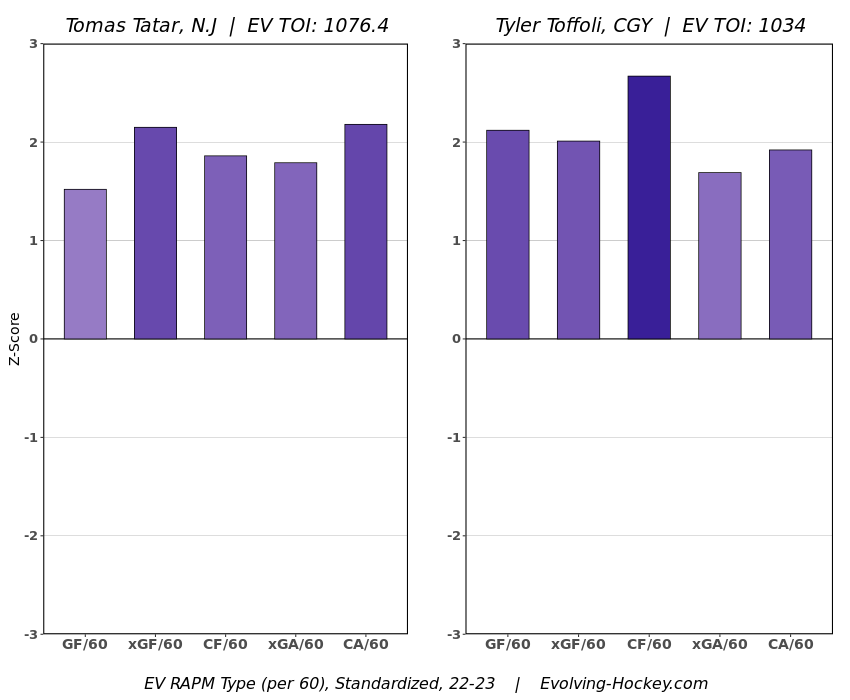
Tatar's problem is that top-end play-driving completely disappeared in the postseason as the Devils were outscored 9-2 with Tatar on the ice, and were out-played when he was on the ice, too. Over the last four games of the playoffs, Tatar skated a little over 11 minutes a night, compared to 15:14 over the first 11 games. Whether it's a harbinger of his future or a blip on the radar remains to be seen, but more of what he did in the regular season, with some power play time, makes him a 20-goal, 50-point threat in the right spot.
James van Riemsdyk (Alex's projection of $2.39)
The older van Riemsdyk is certainly not the player he was five years ago as his three-year goal rate at 5-on-5 is in the 39th percentile of the league, or a third-line rate. His power-play goal scoring rate, though, works out to the 84th percentile, or a top-line rate higher than names like Alex DeBrincat, Evgeni Malkin, and Sebastian Aho. His worst PP goal mark of his career came in 2022-23, though, so teams need to figure out whether that is a blip or a trend, much like with Tatar's playoff performance.
We won't go long here but with the importance of power-play scoring rising, and JvR largely still showing a penchant for PP scoring (as long as 2022-23 is a stumble and not the start of a true decline), he could be productive in a depth role with skill players, not unlike the aforementioned Daniel Sprong.

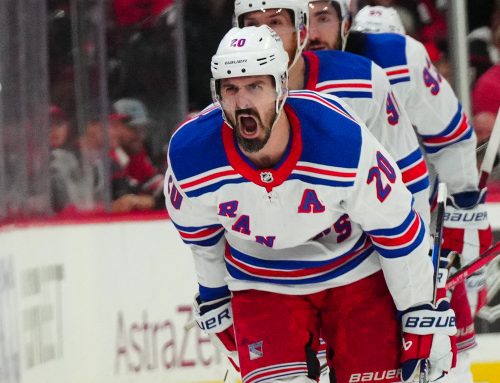
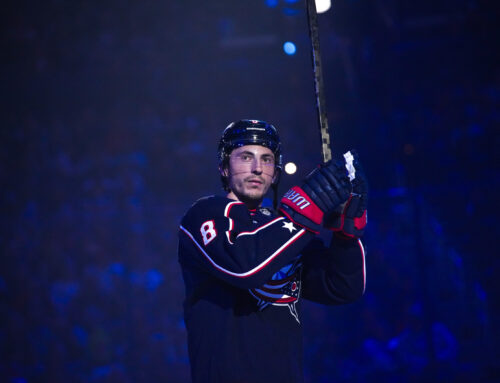
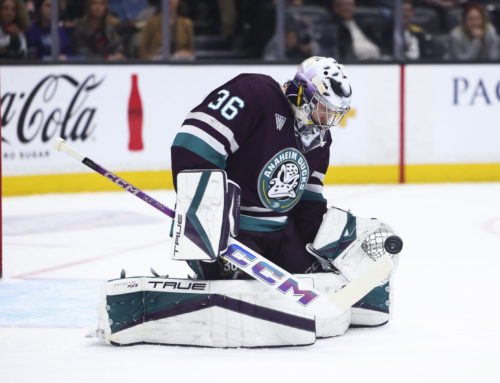

 FLA
FLA EDM
EDM MTL
MTL ANA
ANA VGK
VGK DET
DET BUF
BUF SEA
SEA COL
COL N.J
N.J L.A
L.A CGY
CGY
